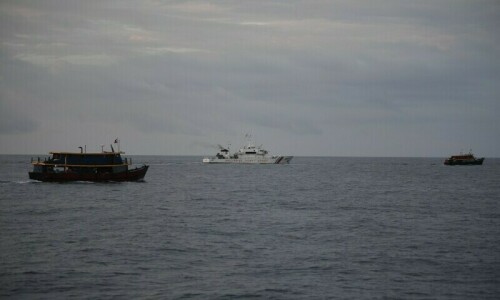THAT Pakistan has thus far managed to steer clear of the fires in the Middle East is no less than a miracle.
The Pakistani government dodged the Saudi request for direct involvement in Yemen last year. But this pressure will sustain. The reason is simple: there is no other Muslim country that has deep links with key Arab regimes and can be coerced to lend an army actually worth its salt.
Quite apart from the Saudi demand, Pakistan also risks being burnt if the principal beneficiaries of the chaos in the Middle East — the militant Islamic State group and its affiliates — extend their reach into South Asia proper. They are already operating in Afghanistan and beginning to do so in Pakistan.
This is hardly surprising: after all, they have old connections here from the time they were part of Al Qaeda; they espouse a sectarian agenda that appeals to Sunni extremist outfits in Pakistan; and any number of militant groups out of favour and under attack from the Pakistani state are in desperate need of a patron that Al Qaeda no longer is.
Pakistan must avoid getting sucked into this mess.
Pakistan must avoid getting sucked into this mess. The starting point for this has to be the recognition that Islamabad’s traditional pro-Arab policy has been overtaken by events.
Iran has made a diplomatic comeback. And since Iran isn’t a regime — it’s a real state with real institutions and a controlled but functioning democracy — it has a greater chance of cashing in on this opportunity to alter the balance of power in the region. Meanwhile, the Saudi-led coalition seems insistent on ignoring the single-most obvious lesson from the post-9/11 wars: use of kinetic force, especially in foreign territory, has not and cannot defeat the kind of non-state actors/dissidents fighting discredited, misgoverned Muslim states.
The present Saudi force-heavy strategy won’t deliver and as the House of Saud’s desperation grows, they’ll inevitably look to crank up the pressure on Pakistan. We’ve already seen hints of a ‘with us or against us’ ultimatum — mercifully so far only from an Emirati minister shooting from the hip.
But when this comes seriously and directly from the Saudis, we’d be stuck — for defying this block beyond a point entails grave costs. Foremost amongst these would be a possible move towards Pakistani diaspora repatriation that is virtually unaffordable given the economic burden it entails and the hardened religious interpretations the expats are likely to bring back with them.
But Arab desperation could also lead to more blatant coercion, most obviously, by stoking sectarian fires within Pakistan. Of course, obliging the Arabs could lead the Iranians to consider the same approach to force Pakistan to rethink such a move.
Pakistan’s only recourse is to play the middle. It should proactively mediate the conflict. Not just by making high-level visits to Tehran and Riyadh. I am imagining a permanent backchannel to identify a middle ground in Yemen that convinces the Arab world to drop their demand for mercenary Pakistani forces.
Meanwhile, the traditional Pakistani direct (physical protection) and indirect (political) support to Arab countries should continue, and perhaps be buttressed further as a reassuring tactic. Arab states beginning to face domestic terrorism will also increasingly need counterterrorism assistance. Pakistan has a wealth of experience to contribute here and should do so eagerly — again, without putting any of its own personnel on the ground.
To Iran, this rather ambivalent Pakistani position must be presented as being contingent on its assurance that the Saudi mainland will not be threatened under any circumstances. For crossing this line would be the surest way to panic Arab regimes and force them to read the riot act to Pakistan if it still remains non-committal.
As for IS, there is no room for complacency. But thankfully, the most critical state response here is already in play. At this stage, you’ve basically got to prevent the IS franchise from becoming a networked group. This requires preventive counterterrorism techniques coordinated between the civilians and the military. This is an area where the security apparatus seems to be doing better than any other.
That said, the one factor that could dent my cautious optimism is negative regional developments.
If the situation in Afghanistan goes further south and spills over into Pakistan or if the eastern border heats up, the state’s attention will be diverted. IS and its affiliates will find precisely the kind of space and time they need. Pakistan should be on the lookout for IS-inspired attempts to create circumstances that could lead a breakdown in Af-Pak or Pak-India relations.
Pakistan has survived the Middle Eastern storm so far. But things will continue to heat up in the Arab world. As they do, the demand for Pakistani presence there as well as the potential for IS to expand outside the Middle East will only increase.
The writer is a foreign policy expert based in Washington, DC.
Published in Dawn, February 16th, 2016












































